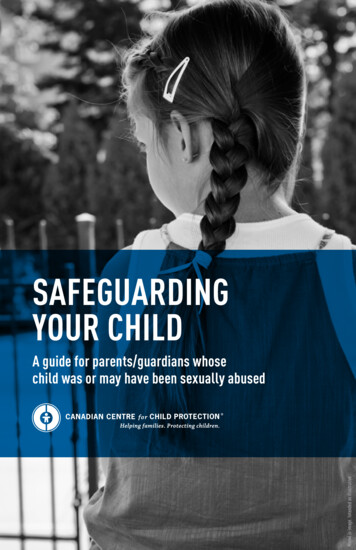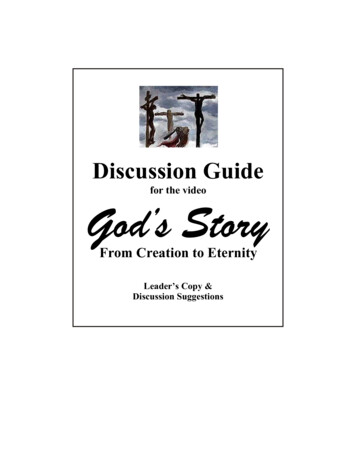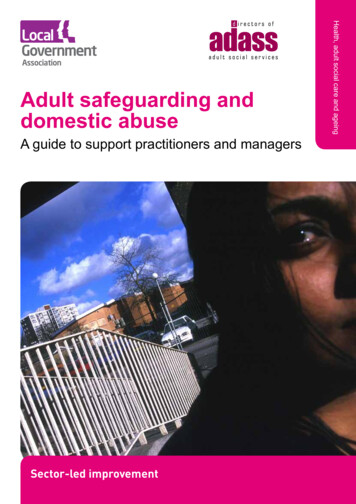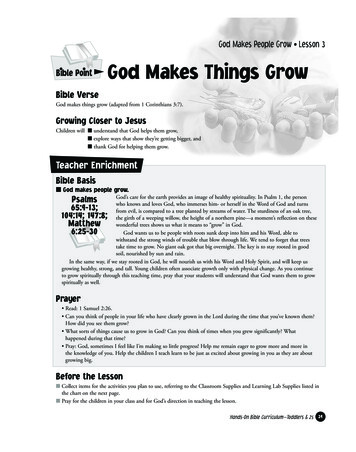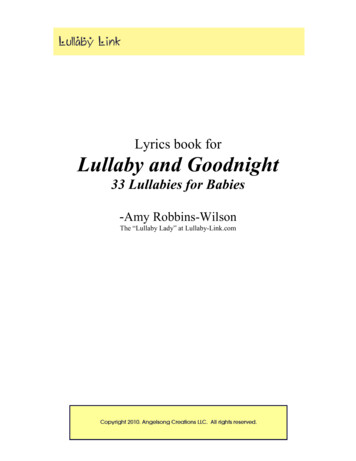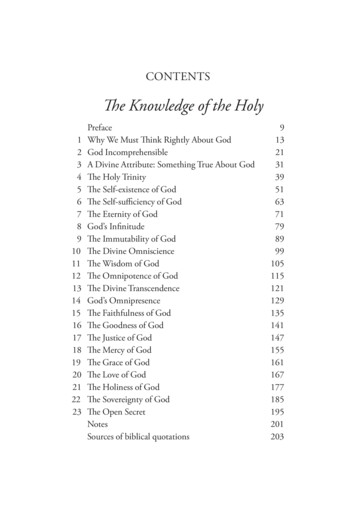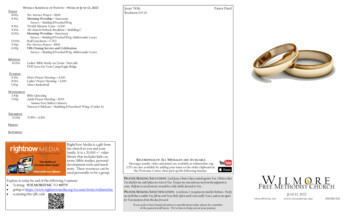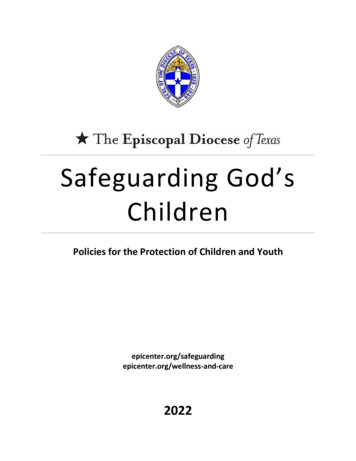
Transcription
Safeguarding God’sChildrenPolicies for the Protection of Children and ess-and-care2022
Dear People of the Diocese of Texas,One of the things that the Covid-19 pandemic has taught us is the immeasurable value of ourrelationships with one another. Safeguarding is about taking the steps necessary to protect thoserelationships from behaviors that can lead to abuse, exploitation, or neglect and about takingappropriate action when healthy boundaries have been crossed.It’s a changing world, and we continue to grow as a diocese in our understanding of what it meansto provide nurturing and respectful environments for people in all their diversity, whether wegather in person or virtually. One thing is certain; we are called to love as Christ loved us. Throughour daily awareness and practice of Safeguarding, we offer communities where people of all agescan know that they are valued and loved. In a world too frequently marred by hatred and division,I can’t imagine a more precious gift. I am deeply grateful for your partnership in this holy work.Faithfully,IX Bishop of TexasJanuary 2022The Episcopal Diocese of Texasepicenter.org/safeguarding/home2
About These PoliciesThis document is a statement of general expectations of behavior in the Episcopal Diocese ofTexas from clergy, lay employees, volunteers, and groups when engaged in ministry with childrenand youth. These policies are mandated for all ministries and programs of diocesancongregations, schools, and other organizations of the Episcopal Diocese of Texas.No policy can foresee every possible circumstance to which it may be applied. Any additions ormodifications by local leadership to these policies may be made only with the written approvalof the Safeguarding Minister.Application of These PoliciesThese policies apply to all congregations, schools, and other organizations that operate underthe authority of the Episcopal Diocese of Texas.These policies address ministry with children and youth. Ministry with adults are covered by TheEpiscopal Diocese of Texas, Safeguarding God’s People: Policies for Safe Ministry with Adults.Responsibility for ImplementationThe heads of congregations, the heads of schools, executive directors, and any other personserving in these or equivalent roles in diocesan organizations are directly responsible to theBishop for the implementation and administration of the policies and procedures outlined inSafeguarding God’s Children: Policies for the Protection of Children and Youth.The implementation and administration of these policies and procedures may be delegated toother staff members or volunteers, but the ultimate responsibility may not be delegated.Supervision of these administrative processes by the Head of Organization is required toassure appropriate compliance and confidentiality.January 2022The Episcopal Diocese of Texasepicenter.org/safeguarding/home3
Table of ContentsSection I. Definitions .6A. Age Categories . 6B. Personnel . 6C. Terms . 7Section II. Creating Safe and Healthy Environments .9A. Behavioral Standards for Personnel . 9B. Sexual Activity Between Children/Youth . 11C. Basic Needs . 11D. First Aid and Medications . 12E. Discrimination and Harassment . 12F. Bullying . 12G. Weapons and Violence . 13H. Alcohol . 13Section III. Monitoring and Supervision of Programs . 13A. Accessibility of Information . 13B. Approval and Tracking of Activities . 14C. Responsible Person . 14D. Two Adults Rule . 14E. Unanticipated Circumstances . 15F. Unrelated Persons. 15G. Ratios . 15H. Release . 15I.Visibility and Security . 16J.Private Activities . 161. No adult may shower, bathe, or use restroom in the presence of children or youth. 162.Supervising dressing, showering, or diapering . 163.Safe restrooms, locker rooms, and shower facilities . 164.Diapering . 165.Age-Appropriate Restroom Supervision . 16K. Virtual Ministry, Social Media, and Digital Communications . 18L. Teaching Children and Youth to Keep Themselves Safe . 20Section IV. Prior Parental Approval and Registration, Waiver, and Release Forms . 20A. Prior Approval by Parent. 20January 2022The Episcopal Diocese of Texasepicenter.org/safeguarding/home4
B. Registration, Waiver and Release Forms . 20Section V. Off-Site Events, Travel, and Overnight Events . 20A. Prior Approval of Off-Site Events . 20B. Adult Supervision . 21C. Additional Rules for Travel . 21D. Transporting Children and Youth . 22E. Overnight Events . 22Section VI. Code of Conduct . 23Section VII. Safeguarding Certification Requirements . 24A. Certifications . 24B. Deadlines, Recertification, and Transfers of Location . 25C. Certification Exceptions . 261. Parent Volunteers . 262. Youth Helpers . 263. Training Only Agreements (Schools & Vendors). 264. Tutors and Independent Instructors . 27Section VIII. Reporting. 28A. Suspected Abuse of Children or Youth . 28B. Behaviors Inconsistent with Policies . 29C. Diocesan Contacts/Intake Officers. 30D. Methods for Reporting. 30E. Reporting Protection . 30F. Investigation and Enforcement. 30Appendix Guidance in Reporting Neglect or Abuse of Children or Youth . 31January 2022The Episcopal Diocese of Texasepicenter.org/safeguarding/home5
I. DefinitionsA. Age Categories1. A child is defined as anyone under the age of 12 years.2. A youth is defined as anyone who is at least 12 years old, but not yet 18 years oldand also includes anyone who is 18 years old or older and still in high school.3. An adult is defined as anyone who is 18 years or older who is not in high school andwho is not a vulnerable adult.4. A vulnerable adult is defined as anyone who is 18 years or older who has specialneeds of a physical, age-related or mental nature.B. PersonnelThe following are included in the definition of Personnel when they are functioning in theirrespective roles for the diocese or for a diocesan organization. These individuals must completescreening and training in Safeguarding God’s Children (SGC) as set out in Section VII:1. All members of the clergy whether stipendiary, non-stipendiary, canonically resident inthis diocese, or licensed in this diocese, who are engaged in ministry or service.2. All employees, full or part time, whether employed in areas of ministry or other kindsof services by the diocese or diocesan organizations, whether or not the employeeswork directly with children. An exception may be made by the Safeguarding Ministerfor employees of an organization when the entire organization has no contact withchildren or youth in the course of its ministry.3. Vendors (those who are not employees but contract their services to the diocese ordiocesan organizations) who routinely work with or around children or youth, unlesstheir only contact with children or youth is during a worship service where children andyouth are being supervised by other adults. For any other exception, consult with theSafeguarding Minister.4. Volunteers serving in staff positions whether full time or part time, regardless ofwhether they work with children or youth.5. All persons with general key or code access to locked buildings where children or youthmay be present without adequate adult supervision. See also Section III.B.3.6. Volunteers in activities for children and youth, including any person who offers toserve in activities for children and youth or who actually assists with such activities.January 2022The Episcopal Diocese of Texasepicenter.org/safeguarding/home6
7. All volunteers whose work routinely takes them throughout the facility or groundswhen children or youth are present, other than during an activity or worship servicewhere the children and youth are being supervised by other adults. For any otherexception, consult with the Safeguarding Minister.8. Youth who assist in ministries or programs for children or youth such as camp, VacationBible School, childcare, mission trips, or retreats.Examples of Personnel include, but are not limited to: Children’s or youth choir directors Sunday school teachers and staff Vacation Bible School/Camp teachers and staff Lay youth formation directors and directors of Christian education Nursery workers All adults who supervise children in any capacity Teachers, substitute teachers, and staff in parochial or other Episcopal schools, fullor part-time, contract or volunteer Adults who participate in overnight activities with children or youth Security guards or regular maintenance persons who work with or around childrenC. TermsAbuse: Includes physical abuse (non-accidental injury intentionally inflicted upon a child oryouth, sexual abuse (any sexual contact, indecency, or activity of a sexual nature with aminor), and emotional abuse (mental or emotional injury to a child or youth that results inan observable and material impairment in the child’s or youth’s growth, development, orpsychological functioning).Bullying: Behavior that intimidates, humiliates, offends, degrades, or harms another person,whether verbally, psychologically, or physically.Clergy in Charge: A member of the clergy who is in charge of a program for children andyouth. In a congregation, this is the head of the congregation unless the head has appointedanother clergy staff member as the Clergy in Charge of a program.Diocese: The Episcopal Diocese of TexasHead of Organization: The person who is the canonical head of a congregation or the chiefexecutive officer of an organization, such as a head of school or executive director.Intake Officer: The person(s) designated by the diocese to receive information regarding anoffense for which a member of the clergy may be held accountable under Title IV of theJanuary 2022The Episcopal Diocese of Texasepicenter.org/safeguarding/home7
Constitution and Canons of The Episcopal Church, which sets out the disciplinary process forclergy. Anyone may contact an Intake Officer to report concerns.LGBTQ : An acronym for Lesbian, Gay, Bisexual, Transgender, Queer/Questioning, andothers. It refers to people whose gender identities vary from their sex assigned at birth, orwhose sexual orientation differs from the heterosexual majority. The “ ” is an effort toinclude gender non-binary and other gender identities that do not conform to traditionalgender categories. This is an evolving term.Mandated Reporter: A person who is required by state law to report reasonable suspicionsof abuse, neglect, and/or exploitation of vulnerable populations to the appropriate stateagency. Under Texas law, all adults are mandatory reporters of suspected abuse of childrenor youth.Neglect: The failure to provide for a child’s or youth’s basic needs and/or medical needs or totake action to protect a child or youth from harm.Off-Site: Any location other than the facility of the diocese or diocesan organization in whichthe ministry is based.Organizations: All institutions authorized by the diocese or its congregations, includingfellowships, missional communities, college ministries, schools, camps, retreat centers, andsocial service organizations.Overnight: Any event that starts on one calendar day and ends on a different calendar day.Peer Abuse: Any bullying or abuse occurring between children, between a child and a youth,or between youth.Programs: Official activities and programs sponsored by the diocese or its organizations.Programs expressly include troops of The Boy Scouts of America (BSA), because the BSArequires troops to be chartered by the church or other organization.Responsible Person: The person designated as being accountable for compliance with thispolicy for an event or program. Such person must be (i) an adult who has been trained andscreened under these policies and (ii) physically present during the event.Sacramental Use: Consecrated or unconsecrated wine used in the setting of Eucharist.Supervisor: A person who has oversight responsibilities for a ministry program and/orPersonnel in a ministry program. The Supervisor may or may not be the Clergy in Chargeand/or the Responsible Person.January 2022The Episcopal Diocese of Texasepicenter.org/safeguarding/home8
Title IV: A section of the Constitution and Canons of The Episcopal Church pertaining to clergyprofessional standards, accountability, and ecclesiastical discipline.Training: An organized activity designed to provide information and/or instructions tostrengthen and enhance the recipient’s understanding, capacity, and exercise of ministry.Transgender: An adjective describing a person whose sense of gender identity does notcorrespond with the gender or sex they were assigned at birth. This is an evolving term, asour understanding and language around gender identity and sexuality expands and matures.Travel: An event for children and youth that involves spending the night in multiple locationsover more than two calendar days.Youth Helper: A youth who assists adult Personnel in a program involving children and youth.II. Creating Safe and Healthy EnvironmentsA. Behavioral Standards for PersonnelThese guidelines will help identify and prevent behaviors and interactions which may be used to“groom” children, youth, and their parents, or which may create conditions where abuse byadults or peers can more easily occur. They are not designed or intended to address interactionswithin families.1. Personnel will offer a positive role model by treating children and youth with patienceand with equal respect and consideration, regardless of sex, race, religion, nationalorigin, disability, sexual orientation, gender identity or expression, or socio-economicstatus. Ways of showing respect and consideration may include taking into accountdiffering levels of abilities when planning activities, correctly pronouncing unfamiliarnames, using stated pronouns, allowing for the expression of cultural differences, andtaking care not to show favoritism.2. Personnel will conduct any one-to-one talks with children and youth in an open or publicplace where private conversations are possible but occur in full view of others. AResponsible Person shall be informed in advance about any planned conversations. Whensuch conversation is unplanned, the Responsible Person shall be informed as soon aspractical.3. Personnel are encouraged to offer appropriate displays of affection that respectphysical, emotional, and behavioral boundaries, including but not limited to thefollowing examples:January 2022The Episcopal Diocese of Texasepicenter.org/safeguarding/home9
High fives and fist bumpsHandholding while walking with small children or in prayerBrief touching of shoulders, hands, or arms“Laying on of hands” and/or anointing under appropriate pastoral supervisionBrief hugs and arms around shoulders4. Personnel shall not engage in behaviors that cross physical, emotional, andbehavioral boundaries, including but not limited to the following examples: Any unwanted form of physical affection Inappropriate or lengthy embraces Kisses on the mouth Holding children over 3 years old on the lap Touching bottoms, chests, or genital areas other than appropriate diaperingand toileting of infants/toddlers Showing affection in isolated areas such as bedrooms, staff-only areas Touching knees or legs, wrestling, or tickling children or youth Piggyback rides Any type of massage given by a child or youth to an adult Any type of massage given by an adult to children or youth Snapping bras, giving “wedgies,” or similar touching of underwear Comments or compliments (spoken, written or electronic) about physique orbody development Giving money or gifts to individual children or youth Private meals with individual children or youth Inappropriate interaction on social media (See Section III.K.)5. Personnel who develop private relationships with children or youth outside of ministryactivities (e.g., using youth as babysitters or for yard maintenance) will (i) do so only withthe permission of parents or guardians and (ii) notify the Program Supervisor orResponsible Person of the program in which the Personnel and child or youth areinvolved.6. Personnel shall not use, possess, distribute, or be under the influence of alcohol or illegaldrugs, or misuse legal drugs or prescription medications while participating in or assistingwith programs or activities specifically for children and youth. See also the diocesanAlcohol Policy.January 2022The Episcopal Diocese of Texasepicenter.org/safeguarding/home10
7. Personnel shall not provide children or youth with non-sacramental alcohol, marijuana,drugs, tobacco products, e-cigarettes, vapes, or pornography. See also Section II.H.below and the diocesan Alcohol Policy.8. Personnel shall not engage in sexual contact with a child or youth or becomeromantically involved with a child or youth.9. Personnel shall not possess, download, or view any sexually oriented or explicitmaterials on the property of the diocese or any organization or in the presence of childrenand youth (with the exception of sexually oriented materials that are part of aneducational program that is pre-authorized by the diocese or the Head of Organization).10. Personnel shall not discuss their own sexual activities, including dreams and fantasies,or discuss with children or youth their use of sexually oriented or explicit materials suchas pornography, videos, or materials.11. Personnel shall not sleep in the same bed or sleeping bag with children or youth unlessthe adult is an immediate family member.12. Personnel shall not use physical punishment in any way for behavior management ofchildren and youth, including spanking, slapping, pinching, or any other physical force.Physical force may only be used to stop behavior that may cause immediate harm to thechild or to others.13. Personnel shall not use harsh language, profanity, degrading language or punishment, orany mechanical restraint for behavior management.B. Sexual Activity Between Children/YouthAlthough not all sexual activity between children or youth is abuse, sexual activity of any kindbetween children or youth is not appropriate in connection with activities sponsored by thediocese or organization, regardless of where it takes place. Personnel must intervene to stop suchactivity by a child or youth and report it immediately as a policy violation and may need to reportit as abuse. (See Section VIII.)C. Basic NeedsNo one is to be deprived of the basic human needs of food, drinking water, shelter, adequateJanuary 2022The Episcopal Diocese of Texasepicenter.org/safeguarding/home11
sleep, access to restrooms, safety, and clothing at any event. Adequate sleep means theopportunity to sleep for at least 7 hours.Exceptions may be made for programs intended to teach children or youth about poverty, needs,and hunger, such as an intentional fasting program. In these cases, children and youth must agreeto participate in writing, and parents or guardians must give written permission that includescertification that the youth or child does not have a medical condition that would put theparticipant at risk by fasting or missing sleep. Participants who wish to withdraw or who areunable to complete the program must have their basic needs met immediately.D. First Aid and MedicationsAt all activities for youth or children, the following rules apply:1. First Aid Kit: An appropriately stocked first aid kit shall be available in an easily accessiblelocation.2. Medications: All medications (prescription and over the counter) belonging to minorsshall be given to the Responsible Person, unless otherwise agreed upon by the parentsand the Responsible Person. Recommended exceptions include inhalers and epi-pens.Subject to the above exception, the Responsible Person or the Responsible Person’s adultdesignee shall administer all medications.3. Records: A record must be kept for all medications or first aid given to a participant thatincludes; the name of the person administering the medication or treatment, adescription of the medication, dosage, and time of medication/treatment.4. Current Certification: Current certification in First Aid, CPR, and Automated ExternalDefibrillator (AED) is encouraged for persons working with children and youth.E. Discrimination and HarassmentThe Episcopal Diocese of Texas prohibits discrimination or harassment toward any person basedon race, color, sex, sexual orientation, national origin, age, religion, or disabilities. Personnel mustreport immediately incidents of discrimination or harassment under the provisions of Section VIII.F. BullyingBullying violates a person’s sense of worth and his or her immeasurable value to God. Bullying ismanifested in various ways: abusive language, offensive name calling, acts or threats of physicalJanuary 2022The Episcopal Diocese of Texasepicenter.org/safeguarding/home12
abuse, vandalism, theft, or destruction of property. Bullying of all forms, including bullying orbullying based on sexual orientation or gender identification or expression, inhibit a person’sability to feel safe in our organizations. Bullying of any form will not be tolerated in organizationsof the Episcopal Diocese of Texas. Personnel must report incidents of bullying under theprovisions of Section VIII.G. Weapons and Violence1. General Weapons Policy: The Episcopal Diocese of Texas does not permit any person,including clergy, staff, students, volunteers, and visitors, to carry a weapon in ourchurches, congregations, schools, or organizations. This prohibition applies even if theperson is licensed to carry a concealed weapon under Texas laws. Law enforcementofficers are the only exception to this policy. There are three ways to give legal notice thatthe property is a gun free zone: (1) signs posted at entrances, (2) a printed card or otherwritten communication and (3) oral communications. Notification details can be foundhere: Gun Law and Policy. Personnel must report violations of this policy under theprovisions of Section IX.2. Specific Weapons Policy Involving Children and Youth: Children and youth shall not haveweapons of any kind, or items which may easily be used as weapons (e.g., pocketknives,machetes, bows and arrows, etc.), at any event or program for children and youth exceptas expressly permitted in camp programs or other programs with prior approval from theHead of Organization.3. Violence: No one is to strike, hit, or otherwise physically threaten or harm anyone at anytime at activities involving children or youth.H. AlcoholAll alcohol, including alcohol for sacramental use, must be stored in an area inaccessible tochildren and youth. Alcohol may not be served at events designed for children and youth exceptfor sacramental use. (See also Section II.A.7. above and the diocesan Alcohol Policy)III. Monitoring and Supervision of ProgramsPersonnel must monitor and supervise programs for children and youth so that inappropriatebehaviors by adults, youth, and other children can be detected and stopped. The following rulesapply whether or not the programs take place on property belonging to the diocese ororganization.January 2022The Episcopal Diocese of Texasepicenter.org/safeguarding/home13
A. Accessibility of InformationThe Policies for the Protection of Children and Youth shall be posted in an area where activitiesfor children or youth take place, along with the names and phone numbers of the member ofthe Clergy in Charge (if applicable), the Program Supervisor, the Head of Organization, and (inthe case of a congregation) a Warden. Such information shall also be given to all parents,guardians, and Personnel.B. Approval and Tracking of Activities and People with Access1. No new activities for children and youth shall be developed without written approval ofthe Head of Organization (or in the case of the diocese, of the person in the bishop’s officewho oversees programs for children and youth). Requests for new activities must be inwriting so that the head can assure that any activity includes adequate adult supervision.2. An up-to-date list of approved programs for children and youth will be maintained by thediocese or organization in the office where such records are kept.3. An up-to-date list of people with general key or code access to the buildings of theorganization will be maintained by the diocese or organization in the office where suchrecords are kept.C. Responsible PersonFor every youth or children’s event, whether held in person or on a virtual platform, aResponsib
our daily awareness and practice of Safeguarding, we offer communities where people of all ages . Safeguarding God's Children: Policies for the Protection of Children and Youth . bathe, or use restroom in the presence of children or youth. 16 2. Supervising dressing, showering, or diapering .16 3. Safe restrooms, locker rooms, and .
